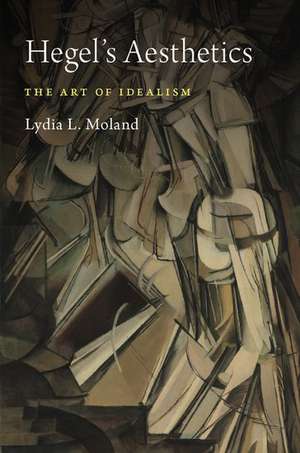Hegel's Aesthetics: The Art of Idealism
Autor Lydia L. Molanden Limba Engleză Hardback – 10 sep 2019
Preț: 516.19 lei
Preț vechi: 629.42 lei
-18% Nou
Puncte Express: 774
Preț estimativ în valută:
98.79€ • 102.75$ • 81.55£
98.79€ • 102.75$ • 81.55£
Carte tipărită la comandă
Livrare economică 04-10 aprilie
Preluare comenzi: 021 569.72.76
Specificații
ISBN-13: 9780190847326
ISBN-10: 0190847328
Pagini: 352
Ilustrații: 15 color
Dimensiuni: 145 x 211 x 33 mm
Greutate: 0.5 kg
Editura: Oxford University Press
Colecția OUP USA
Locul publicării:New York, United States
ISBN-10: 0190847328
Pagini: 352
Ilustrații: 15 color
Dimensiuni: 145 x 211 x 33 mm
Greutate: 0.5 kg
Editura: Oxford University Press
Colecția OUP USA
Locul publicării:New York, United States
Recenzii
The book is replete with interesting insights ... an excellent account for anybody who is interested in Hegel, art history, or intellectual history.
...Moland...argues that a better understanding of Hegel's aesthetics allows one to have a better vantage point for a more comprehensive understanding of and appreciation for his idealism and its role in the history of art...Unique to the book is Moland's examination of particular forms of art and of particular works of art that contributed to Hegel's own thoughts on aesthetics and idealism. Indeed the book includes several pages of artwork that factored into the development of his thought. Moland engages in fascinating commentary on these pieces of art and how they must all be seen as contributing to a holistic Hegelian picture. This book will be of great use to those working on Hegel's aesthetics and his metaphysics and philosophy of mind and psychology. Those unfamiliar with Hegel will find the book a useful overview of Hegel's thought and his place in the philosophical tradition.
Lydia Moland's book is a significant achievement. It is the first comprehensive interpretation in English of Hegel's aesthetics, and in its philosophical sophistication and historical erudition far surpasses its predecessors. Moland is fearless and tenacious in facing the many problems that arise in understanding Hegel's aesthetics, and she offers solutions to them that scholars will need to consider.
Lydia Moland's new book will be the go-to commentary on Hegel's Aesthetics. She combines a comprehensive and systematic treatment of the book as a whole with a sharp sense of contemporary issues about art, its value, and our experience of it. Her reading establishes Hegel's Aesthetics as the single most important book in the history of the philosophy of art -- the one that is such that grappling with it enables one to engage more productively with a wider range of topics and problems about art than any other single book. This is a major achievement
...Moland...argues that a better understanding of Hegel's aesthetics allows one to have a better vantage point for a more comprehensive understanding of and appreciation for his idealism and its role in the history of art...Unique to the book is Moland's examination of particular forms of art and of particular works of art that contributed to Hegel's own thoughts on aesthetics and idealism. Indeed the book includes several pages of artwork that factored into the development of his thought. Moland engages in fascinating commentary on these pieces of art and how they must all be seen as contributing to a holistic Hegelian picture. This book will be of great use to those working on Hegel's aesthetics and his metaphysics and philosophy of mind and psychology. Those unfamiliar with Hegel will find the book a useful overview of Hegel's thought and his place in the philosophical tradition.
Lydia Moland's book is a significant achievement. It is the first comprehensive interpretation in English of Hegel's aesthetics, and in its philosophical sophistication and historical erudition far surpasses its predecessors. Moland is fearless and tenacious in facing the many problems that arise in understanding Hegel's aesthetics, and she offers solutions to them that scholars will need to consider.
Lydia Moland's new book will be the go-to commentary on Hegel's Aesthetics. She combines a comprehensive and systematic treatment of the book as a whole with a sharp sense of contemporary issues about art, its value, and our experience of it. Her reading establishes Hegel's Aesthetics as the single most important book in the history of the philosophy of art -- the one that is such that grappling with it enables one to engage more productively with a wider range of topics and problems about art than any other single book. This is a major achievement
Notă biografică
Lydia Moland is Associate Professor of Philosophy at Colby College. She is the author of Hegel on Political Identity (Northwestern University Press, 2011) and the editor of All Too Human: Laughter, Humor, and Comedy in Nineteenth-Century Philosophy (Springer, 2018). She has published articles on Hegel's political and aesthetic philosophy, the playwright and philosopher Friedrich Schiller, and the American abolitionist Lydia Maria Child. She is the recipient of grants from the NEH, the ACLS, and the American Academy in Berlin.
